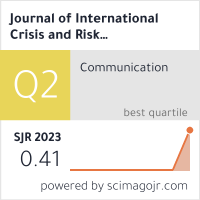Answering the Call for Scholarship: The Journal of International Crisis and Risk Communication Research
Keywords:
Abstract
In the foundational work Normal Accidents, Charles Perrow (1984) observed that advances and globalization of technology were creating a form of “interactive complexity” where seemingly minor failures could escalate and cascade throughout a system, leading to devastating accidents. Furthermore, as technology became more ubiquitous and complex, such accidents become normal in the sense that they are programmed into systems. Tight coupling; lack of buff ers; and interactive, unanticipated nonlinear interactions may create systemic collapse. Simply put, crises of signifi cant magnitude are, as Perrow predicted, increasing in frequency and intensity (Helsloot, Boin, Jacobs, & Comfort, 2012). The magnitude, complexity, and frequency of such events challenge the existing conceptualization of crisis management in general and crisis communication specifi cally (Topper & Lagadec, 2013). Communication is essential to understanding and managing crises in two general ways. First, communication is necessary for meaning making around what are very uncertain and equivocal events. Second, communication is instrumental as part of the crisis and risk management functions (Sellnow & Seeger, 2013). This includes activities such as environmental scanning for risks, creating an eff ective response, resolving crises, and learning the lessons from these events.Downloads
Published
2018-03-17
Issue
Section
Articles
How to Cite
Answering the Call for Scholarship: The Journal of International Crisis and Risk Communication Research. (2018). Journal of International Crisis and Risk Communication Research, 1(2). https://jicrcr.net/index.php/jicrcr/article/view/2










